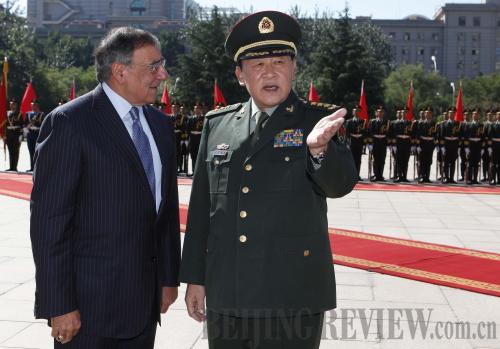|
 |
|
WALKING THE WALK: Chinese Defense Minister Liang Guanglie welcomes U.S. Secretary of Defense Leon Panetta in Beijing on September 18 (CFP) |
When he set foot in China for the first time as U.S. defense secretary on September 17, Leon Panetta might have been uncertain about how Chinese officials would treat him.
Indeed, his visit came at a sensitive moment when regional tensions are jeopardizing trust between the world's two biggest economies. While a bolstered U.S. military presence in the Asia-Pacific remains a prime concern, many in China question Washington's role in the territorial spat between China and Japan over the Diaoyu Islands. Just a day before Panetta arrived in Beijing, the United States secured an agreement to put a second missile defense radar system in Japan.
But the four-day visit turned out to be eye-opening. He not only conducted a frank exchange of views with Chinese leaders but also found himself an eyewitness to the increasing transparency of the People's Liberation Army (PLA). These positive trends will help the two countries establish a "new type of military-to-military relationship," Chinese analysts said.
Panetta had a lot of explaining to do during his visit to China, the second stop on his Asia-Pacific trip, which also took him to Japan and New Zealand, said Luo Yuan, Executive Vice President of the China Strategic Culture Promotion Association. For instance, the U.S. argument that the missile defense radar system in Japan was aimed at protecting Japan from North Korean attacks doesn't convince the Chinese side, because North Korea lacks long-distance projectile capabilities. "It apparently targets China," Luo said.
Since U.S. officials, including President Barack Obama, have reiterated that the United States does not seek to contain China, Panetta should clarify strategic intentions of this move, he said.
Beijing has legitimate concerns about Washington's pivot to the Asia-Pacific region and, most recently, its skewed stance in favor of Japan on the Diaoyu Islands dispute, Luo said. Although the United States claims not to take sides in the issue, in the view of Chinese observers, its actions are not consistent with its words.
At a press conference after talks with Chinese Defense Minister Liang Guanglie, Panetta said the United States intends to establish a "healthy, stable, reliable and continuous" military relationship with China.
"The key is to have senior-level interactions that we are engaging in to reduce the potential of a miscalculation and boost understanding and expand trust between our countries," he said.
During meetings with Panetta, Chinese political and military leaders made it clear that China will make no concessions on issues concerning its core interests including territorial integrity.
"Although the two sides may not dispel deep-seated mistrust with this single visit, the visit at least provided an opportunity for them to communicate with each other," Luo said.
Apart from holding talks with Chinese officials, Panetta visited the PLA Academy of Armored Force Engineering in Beijing. He also traveled to the port city of Qingdao in east China's Shandong Province, where he toured the PLA Navy North Sea Fleet, a first for a U.S. defense chief.
"Unlike in the past, China is now confident enough to show visiting U.S. officials around its military bases," said Jin Canrong, Associate Dean of the School of International Relations at Renmin University of China.
Among the world's major military forces, the PLA is the least familiar to the United States, he said. Given the risks of potential conflict between China and the United States and the rapid modernization of the PLA, the United States is anxious to carry out regular military exchanges with China to learn more about the PLA, he added.
| 